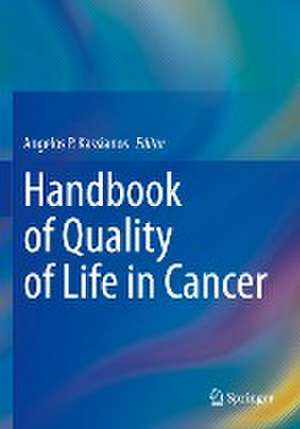Handbook of Quality of Life in Cancer
Editat de Angelos P. Kassianosen Limba Engleză Paperback – 30 mar 2023
- What is quality of life and health-related quality of life and why are they important?
- How is quality of life assessed?
- What are the theoretical and methodological considerations when using quality of life outcomes in cancer research?
- How is quality of life useful in routine clinical care?
- How is quality of life impacting different cancer populations in terms of site of the cancer, age, gender, and context?
| Toate formatele și edițiile | Preț | Express |
|---|---|---|
| Paperback (1) | 908.63 lei 6-8 săpt. | |
| Springer International Publishing – 30 mar 2023 | 908.63 lei 6-8 săpt. | |
| Hardback (1) | 1209.74 lei 39-44 zile | |
| Springer International Publishing – 29 mar 2022 | 1209.74 lei 39-44 zile |
Preț: 908.63 lei
Preț vechi: 956.45 lei
-5% Nou
Puncte Express: 1363
Preț estimativ în valută:
173.95€ • 178.89$ • 144.31£
173.95€ • 178.89$ • 144.31£
Carte tipărită la comandă
Livrare economică 20 februarie-06 martie
Preluare comenzi: 021 569.72.76
Specificații
ISBN-13: 9783030847043
ISBN-10: 3030847047
Pagini: 477
Ilustrații: XL, 477 p. 34 illus., 27 illus. in color.
Dimensiuni: 178 x 254 mm
Greutate: 0.89 kg
Ediția:1st ed. 2022
Editura: Springer International Publishing
Colecția Springer
Locul publicării:Cham, Switzerland
ISBN-10: 3030847047
Pagini: 477
Ilustrații: XL, 477 p. 34 illus., 27 illus. in color.
Dimensiuni: 178 x 254 mm
Greutate: 0.89 kg
Ediția:1st ed. 2022
Editura: Springer International Publishing
Colecția Springer
Locul publicării:Cham, Switzerland
Cuprins
Dedication.- Foreword.- Preface.- About the Editor and Contributors.- list of abbreviations.- List of figures.- list of tables.- Part I: Concepts and Definitions.- 1. Defining Quality of Life.- 2. The Importance of Quality of Life in Cancer Patients.- Part II: Quality of Life Assessment.- 3. Using the WHOQOL as a generic measure to assess quality of life during cancer.- 4. Developing cancer quality of life assessment tools.- 5. The European Organisation for Research and Treatment of Cancer (EORTC) Measurement System.- 6. The Functional Assessment of Chronic Illness Therapy (FACIT) Measurement System: Guidance for Use in Research and Clinical Practice.- 7. Validating Cancer Quality of Life Assessment Tools: Psychometric Considerations.- 8. Using New Technologies in Quality of Life Assessment.- 9. Modern Psychometric Measurement and Computerized Adaptive Testing.- Part III: Best-practice Elements when assessing Quality of Life.- 10. Statistical Considerations in Analyzing Health-Related Quality of Life Data.- 11. Data Visualization Strategies to Communicate PRO Data to Patients and Clinicians.- 12. Cross-Cultural Considerations in Health-Related Quality of Life in Cancer.- 13. Quality of Life and mortality.- 14. Decision-Making in the Context of Funding Cancer Therapy.- 15. Satisfaction with Cancer Care.- 16. Quality of Life and Cancer-Related Fatigue: Prevalence, Assessment and Interventions.- 17. Quality of Life in Adolescents and Young Adults with Cancer.- 18. Proxy measures for quality of life in cancer.- 19. The Role of Psychologists and Psychological Approaches in Cancer Care.- 20. The Role of Patient-Reported Outcomes (PROs) in the Improvement of Healthcare Delivery and Service.- 21. Introduction to Quality of Life in Drug Development.- Part IV: Case Studies of Using Quality of Life Tools for Specific Cancer Types.- 22. Quality of Life and Breast Cancer.- 23. Quality of Life and Brain Cancer.- 24. Quality of Life and Colorectal Cancer.- 25. Quality of Life and Endometrial Cancer.- 26. Quality of Life and Melanoma.
Notă biografică
Angelos P. Kassianos, PhD is a senior research fellow at University College London, Department of Applied Health Research, and at University of Cyprus, Departments of Psychology and Computer Science. He is a health psychologist with a public health and behavioral medicine focus. Dr. Kassianos has interests in bio-psycho-social determinants of disease prevention and early diagnosis (mainly cancer), health-related quality of life assessment, vaccination hesitancy and development of digital health interventions.
Textul de pe ultima copertă
Quality of life is an important outcome when treating a cancer patient. Research is vast on the role of quality of life on patients' general wellbeing, responsiveness to treatment, and even mortality. On the other hand, there are several methodological considerations when planning to measure and assess quality of life in cancer patients. This handbook – with authorship that is diverse in terms of perspectives, countries, and fields – aims to fill a gap in the available literature and responds to a number of questions in its 26 chapters:
- What is quality of life and health-related quality of life and why are they important?
- How is quality of life assessed?
- What are the theoretical and methodological considerations when using quality of life outcomes in cancer research?
- How is quality of life useful in routine clinical care?
- How is quality of life impacting different cancer populations in terms of site of the cancer, age, gender, and context?
Caracteristici
Is the first handbook on quality of life in cancer with diverse authorship of patients, students, clinicians, academics Is an easy-to-use resource of both research and clinical evidence Is useful for students who conduct audits and research with an interest in oncology
